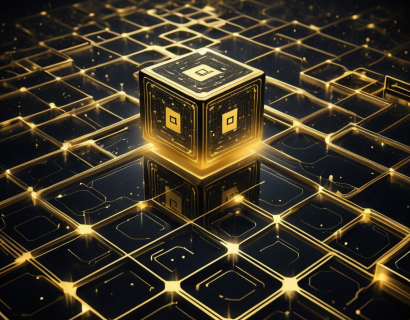Crypto-Powered AI Solutions: Exploring the Future of Decentralized Apps and Services
The intersection of cryptocurrency and artificial intelligence (AI) is giving rise to a new era of decentralized applications and services. This fusion is not only redefining the way we interact with digital platforms but also promising a more secure, transparent, and user-centric experience. As we delve into this topic, we will explore the fundamental concepts, current trends, and future possibilities of crypto-powered AI solutions, particularly within the realm of decentralized technology.
Understanding Crypto-Powered AI
To grasp the potential of crypto-powered AI solutions, it's essential to first understand the basics of both technologies. Cryptocurrency, built on blockchain technology, is a digital or virtual currency that uses cryptography for security and operates on a decentralized network. AI, on the other hand, involves the simulation of human intelligence processes by machines, particularly computer systems. These processes include learning (the acquisition of information and rules for using it), reasoning (using rules to reach approximate or definite conclusions), and self-correction.
The integration of these two technologies creates a powerful synergy. Cryptocurrency provides a decentralized and secure means of transaction and data storage, while AI enhances the functionality and efficiency of decentralized applications. This combination allows for the creation of self-sustaining ecosystems where data is securely shared, and intelligent decisions are made without central control.
Decentralized Applications (DApps)
Decentralized applications, or DApps, are programs that run on a blockchain or a decentralized network rather than on a central server. They leverage smart contracts, which are self-executing contracts with the terms of the agreement directly written into code. This ensures that transactions are transparent, immutable, and executed exactly as programmed.
Crypto-powered AI takes DApps to the next level by incorporating intelligent algorithms that can process and analyze data from the blockchain. These algorithms can automate complex tasks, predict user behavior, and optimize resource allocation within the decentralized network. For instance, AI-driven DApps can manage supply chains more efficiently by predicting demand, optimizing inventory, and automating payments.
Enhanced Security and Privacy
One of the most significant advantages of crypto-powered AI solutions is the enhanced security and privacy they offer. Blockchain's inherent properties, such as immutability and transparency, ensure that data is tamper-proof and easily verifiable. AI algorithms can further enhance security by detecting and mitigating potential threats in real-time.
Privacy is another critical aspect. Traditional centralized systems often struggle with data breaches and misuse of personalinformation. In a decentralized setup, users have more control over their data, and AI can help anonymize and encrypt sensitive information, ensuring that only authorized parties can access it.
Improved Efficiency and Automation
The integration of AI in decentralized systems leads to improved efficiency and automation. AI can process vast amounts of data quickly and accurately, making it ideal for tasks such as fraud detection, risk assessment, and personalized user experiences. In a decentralized environment, these capabilities can be harnessed to create self-managing systems that require minimal human intervention.
For example, AI-powered smart contracts can automatically execute transactions based on predefined conditions, reducing the need for intermediaries and lowering transaction costs. This automation not only speeds up processes but also minimizes the risk of human error.
User-Centric Design and Personalization
Crypto-powered AI solutions enable a more user-centric approach to decentralized applications. By analyzing user behavior and preferences, AI can provide personalized recommendations and tailored experiences. This level of customization enhances user engagement and satisfaction, which is crucial for the success of any digital platform.
Moreover, the decentralized nature of these systems ensures that user data remains under the control of the individual, fostering trust and loyalty. Users can choose how their data is usedand shared, knowing that their privacy is protected by robust cryptographic methods.
Challenges and Considerations
Despite the numerous benefits, the development and deployment of crypto-powered AI solutions come with challenges. One of the primary concerns is the scalability of blockchain networks. Current blockchain technologies often struggle to handle high transaction volumes, which can limit the performance of AI-driven DApps.
Another challenge is the regulatory landscape. The intersection of cryptocurrency and AI is a relatively new territory, and regulatory frameworks are still evolving. Developers and businesses must navigate these uncertainties to ensure compliance and avoid legal pitfalls.
Additionally, the technical complexity of integrating AI with blockchain requires a skilled workforce. There is a growing demand for professionals who can bridge the gap between these two fields, but the supply of such expertise is currently limited.
Future Prospects
Looking ahead, the future of crypto-powered AI solutions is promising. Advancements in blockchain technology, such as layer 2 solutions and cross-chain interoperability, are set to address scalability issues. These improvements will enable more complex and resource-intensive AI applications to run seamlessly on decentralized networks.
The rise of decentralized finance (DeFi) and non-fungible tokens (NFTs) is also driving innovation in this space. AI can enhance these platforms by providing sophisticated risk management tools, personalized investment advice, and unique digital assets with intrinsic value.
Furthermore, the convergence of AI and the Internet of Things (IoT) within a decentralized framework could lead to smarter, more autonomous systems. Imagine a world where devices communicate and make decisions based on real-time data, all while ensuring privacy and security through blockchain and AI.
Conclusion
The fusion of cryptocurrency and AI is paving the way for a new generation of decentralized applications and services. By leveraging the strengths of both technologies, we can create more secure, efficient, and user-friendly digital solutions. As the ecosystem continues to evolve, the potential for innovation and transformation is immense. Whether you are a tech enthusiast, a developer, or a business leader, the future of crypto-powered AI solutions is an exciting frontier worth exploring.



